Summer 2013: Prose
Black Sharpie
Non-fiction by Anne Gudger
“You’ll want to write his name in his clothes,” says a 50-something nurse here at St. Francis Hospital in Federal Way, her hand dusting my forearm. “Everything,” she adds. “You’d be shocked by what gets lost at a nursing home.”
My stomach buckles and somersaults. I can’t. Write in his clothes? My stepdad would be pissed.
“Really,” she insists nodding her head, her wavy gray hair waving. “I’ll get you a Sharpie.” She disappears to the nurses’ station full of blinking lights, impatient phones and permanent markers.
Deface J.’s clothes? No. But I have to. Mom with her head in her hands, shoulders slumped, full of I’m not built for battle. I’m elected Marker of the Clothes. I breathe deep to imagine a different scenario: Packing for summer camp just like I used to do for my kids. I cradle J.’s clothes – a pile of pants and shirts and T-shirts and slip-on shoes. I pop the cap off the Sharpie. That permanent marker smell hits me, punctuating what I have to do.
* * *
J. is my stepdad. Some say stepfather but he’s so much more. English doesn’t have enough labels for family relationships. He’s my other dad. My second dad. The hero dad who rode in when I was ten. Not the weekend Dad I also loved; J. was the daily dad who loved us three girls – Lisa 13, me 10, and Janis 5 – like we were his from the start. He drove us to ice skating, to the ski bus before sunrise; he taught me how to fish for trout, swallow a pill, wash a car down to shining the whitewalls, change the oil in my car. He stressed the importance of not wearing too much perfume (“We don’t want to smell you before we see you”) and eating healthy (“Have some. It’ll grow hair on your chest”).
When he and Mom came home from their honeymoon more than 40 years ago, I hurled myself against his chest, squealing, “Can I call you Dad now?”
He smiled and said, “Sure, Kid. If you want. That’d be nice. But I don’t want to offend your dad.” He rubbed the top of my head with his knuckles.
“I have two dads,” I said and squeezed his waist. “I’m lucky that way.”
I’ve said it all these years: two dads. Lucky me. Two granddads for my kids. Lucky them.
* * *
Bright overhead lights and disinfectant bring me back to my marking chore. Summer camp, I tell myself. Imagine he’s going to camp. I plunk on the hard hospital hall floor, legs folded beneath me. A lanky young man pushes the lunch cart packed with pressed turkey and grey gravy down the hall, the wheels squeaking on the polished speckled linoleum.
I smooth each piece of clothing and write “J. Upton” in tidy block letters. Robin’s egg blue polo. Khaki pants. Tube socks. White boxers. Merrell slip-ons. “Even his hat?” I ask the nurse as she bristles by me and my graffiti project. “Hat, too.” I rub my hand across the crown of his hat – one of many in a series of Irish wool walking hats with their short brims and distinctive M-shaped profiles. I bought him one when I was studying in England my junior year of college and he’s worn this style ever since, almost 30 years.
The bridge of my nose pinches like it does before I cry. My throat gets thick and straw-sized.
Summer camp, summer camp, summer camp, I repeat, mantra-like. I take a big breath, mutter, “shit” and start.
On the inside of the brim, the sweatband, I print “J. Upton” all in caps. J. Just like that because it’s really his name. Just one letter.
Will he need bug spray? Tent poles? Playing cards? I think about the times I’ve readied my kids for camps: Scout camp, Outdoor School, Snowboard camp.
“Do you have to write my name in my undies?” First Jake (the oldest) then Maria (the youngest) protested.
“Yeah, I do. But I’ll leave our phone number off, okay?”
"Mo-om,” both kids took their turn saying. Jake with his palms raised. Maria with her fists on her hips.
I try to imagine my stepdad paddling a canoe, grumbling at craft time, over toasting his marshmallows. Zinc oxide on his nose. Mosquito bites dotting his arms and legs like constellations. But I can’t. Camp is too far from the nursing home.
J. had a stroke. He’s spent five days in the hospital, climbing in and out of consciousness, deciding if he is staying in his body, or if it’s time to die. My mom and sisters and I have been here, sitting and sleeping in his hospital room, wondering what he’ll do, wondering how we’ll live if this anchor of a man pulls up anchor.
* * *
The morning of J.’s stroke, my older sister Lisa called: “J.’s weak. Mom and I are trying to get him to sit up and eat breakfast. He’s a wet noodle. What should we do?”
I was home, 150 miles away in Portland. “Call 911,” I told her. “I’ll pack a bag and be there in three hours.”
Fast packing. Fast driving. The whole time thinking about this huge change in J. He is in the early stages of dementia, but still himself in many ways – quick with a joke, a smile. He’s slow, but he feeds and dresses himself. He gets annoyed if we do things for him where he’s capable. What happened that he couldn’t sit up?
I got to the emergency room in time to hear a doctor ask, “Who’s the president?”
“A friend of mine,” my stepdad said.
I had just slipped in his curtained room, quiet. Not wanting to be here. Not wanting to not be here.
“Okay, but can you tell me his name?” the ER doctor pushed, his oversized hand cupping J.’s shoulder.
J. stared at me. I almost mouthed “Obama.”
“Mr. Upton?”
J. shrugged, pushed out his lower lip. “We had to get rid of George’s son,” he said.
Later, upstairs in a hospital bed, he guessed at the year (“1998? ’99?”). Before dementia he’d managed an auto parts warehouse for 25 years where he rattled off part numbers and knew how many filters were in stock. He was a detail guy who built his own stereo from a Heath kit and subscribed to a pile of electronic and woodworking magazines. J. fabricated his own woodworking jigs when Home Depot didn’t have what he needed.
Now he couldn’t touch the end of his nose with his fingertip. He thought he was at a military base. He told a doctor he was talking to God.
“What’s God saying, Mr. Upton?” the internist asked, dark hair, dark eyes, dark skin. From Pakistan I thought that lyrical lilt in her voice. My mom, sisters, and I leaned in.
“He’s talking about home,” J. said with a sigh. “It might be time to come home.”
That night my sisters and I kept vigil: changing guard between the hard vinyl loveseat down the hall and dozing in J.’s room in the visitors’ recliner chair that doesn’t really recline. J. tossed his covers off, clutched at his hospital gown, kicked his legs and swung his arms. All night long he cycled between resting and flailing.
In the morning a curly headed nurse with bubble gum pink lipstick asked him, “Mr. Upton, do you know where you are?”
He studied the ceiling.
“Mr. Upton? Do you know where you are?”
J. stared at the holes in the acoustical tiles.
“Yeah. A hole in the universe,” he said.
She thought for a beat. Scratched her forearm. “Do you know why you’re here?”
“I fell through.”
A hole in the universe. A narrow passageway. A sliver of a life that was big with racing motorcycles, woodworking, gardening, fox-trotting, fixing anything that needed fixing in the house; a life that was big with Mom and us girls; a life full of music and books and philosophical talks; a life peppered with smoking a pipe, sipping Jack Daniels and always choosing Chinese food for take-out. That big life shrunk to Cheerios for breakfast, a morning nap, the History Channel on TV, another nap, lunch and dinner and more sleeping. That hole in the universe travels one way. It doesn’t have room for all his loves.
* * *
I slip J.’s folded, marked clothes into a plastic hospital bag: St. Francis Hospital printed on the side. After medical transport arrives, I hound the staff until discharge papers are signed. Two drivers load J. up to drive him less than one mile to Garden Terrace – a nursing home my sisters and I picked because the staff to patient ration is high, it’s clean and doesn’t smell like urine.
Mom, J., Lisa, Janis and I arrive at Garden Terrace with its soft yellow exterior and dusty rose interior. We’re nomads who lost their one bag. Mom and Lisa are going to stay the first night in J.’s room so Lisa and I make a flying, buying trip through Fred Meyer’s. In a crazed rush we buy a sleeping bag, sweats for Mom, a TV with a built-in DVD, ET and Moonstruck, bananas and Chips Ahoy cookies. All set for the night. Mom and Lisa hunker down with J., worry about him, worry about his care, worry about the future.
The dad who arrives at Garden Terrace is still, as my sister said, a wet noodle. He can’t walk, sit up, support himself. He can talk – slowly, with long pauses around his end of the conversation. He can feed himself. Sort of. His trembling hand moves the spoon close, just short of his mouth. I watch him eat with my mouth open, willing him to ape the gap. I want to hold his spoon, like I did when my kids were small. I want to play airplane, make the spoon dip and dive: “Here comes the plane. Open the hanger. Here it comes. Vrrrrmm.”
We’ve changed places. We hear this all the time that the child becomes the parent. When I ask my mom to close a door, we both laugh. When my mom asks me if I’ve seen her keys, we laugh. The lighter side of role reversal. But I look at J. and I don’t feel like laughing. I ache for him. The man in front of me is a shrunken edition of the strong dad who was six feet tall. 200 pounds. A man who could move furniture on his own and still pick me up when I hit my adult size. Now he’s 170 pounds and can barely lift a spoon.
* * *
The next four months are punctured with small strokes and more steps down the one-way dementia road. Hospital. Nursing home. Hospital. Nursing home. If I drew J.’s moves it would be one heavy line scribbled back and forth. What next? J. needed more care than Mom could provide. Their home of 37 years got struck off the options list. Best choice: assisted living.
We move them from their home of 37 years with the view of Puget Sound (deep blue water, cloudy skies, clear skies, tug boats, sail boats, power boats, smells of salt water and worn rocks) and cupboards full of memories and J.’s workshop packed with tools and projects he loved. We move them to a one-bedroom assisted-living apartment at Foundation House. We pack favorite things – two stuffed bookcases, family pictures spanning great grandparents to grandkids, blown glass vases, Limoges China for four, an antique mantle clock, an antique mantle queen, motorcycles trophies, swimming trophies, a portrait of Mom my daughter drew when she was five. Their bulletin board that used to be a collage of Christmas card pictures, art from my kids and love notes (“Cobbler’s in the fridge. Enjoy! Love the Cobbler Fairy”) is now covered in shopping lists for the drug store, doctor appointment reminder cards and emergency phone numbers. My sisters’ and my cell phone numbers are tacked up there twice.
While my parents are together, it is not the life they imagined.
I want to do the impossible: Right J. and Mom’s world.
When my kids were small it was easy to soothe them, wipe their tears, hold them, come up with silly stuff that made them feel better, assure them everything will be okay.
I want to do the same for J. – pick him up, wipe him off. But he’s much too big. And unlike my kids, he won’t be growing into his shoes and getting ready for kindergarten. He’s at the other end of life. And I know how this part of the adventure ends.
He’s shutting down. He spends a lot of time turned inward. The man who loved the five-foot-big-head-only-portraits I drew of him and Mom in the sand at the beach with a stick as large as my ten-year-old self, who cheered and put me on his shoulders so I could take pictures of my beach drawings, is quiet now, withdrawn. No more getting excited over teaching little Janis to ride a bike, or saying, “Hold tight and lean with me” as we girls took turns on the back of his motorcycle. No more explaining how an engine works (car, motorcycle, lawnmower) while daughters and a generation later grandkids plopped on a tall yellow stool in his workshop and smelled his pipe – his own blend of cherry tobacco and Sir Walter Raleigh. That man is gone, gone, gone.
The older he gets, the younger he becomes. He lets my family and me feed him, cut his fingernails, wipe up spilled food and drink. When I put his hat on his nearly baldhead, his glasses on his face, his napkin under his chin, he doesn’t protest. He smiles. The sweetest smile. Angelic. Wrinkles fan out around his blue eyes – the shade of blue that’s somewhere between sky blue and sea blue and I can’t help but think that’s where my dad is now: between the sky and the sea.
* * *
Tick off another four months. One. Two. Three. Four.
When I visited my parents at their apartment last week, J. was having a good day: awake and talking. I got there just after lunch. Mom and J. are still adjusting to communal dining – dining room packed with seniors, walkers parked along the walls, wheelchairs scooted up to the tables, a sign next to the coffee pot: “We’ll serve you. Please don’t serve yourself” – after so many years of mostly eating with just each other and the calm of Puget Sound.
“Any good lunch stories?” I asked.
“Oh, there’s always something,” Mom said and sighed as she hung J.’s tweed hat with “J. Upton” printed inside on the coat rack. “Gert didn’t want to let this man sit with her. She thought he was her old neighbor who was mean to her dog.”
J. rubbed his chin with his thumb and forefinger. “Wherever there are people, there are fruitcakes,” he said.
“Oh, J.,” Mom said, her frown wrinkles deepening.
He raised his hands, palms skyward. “What?”
“Nothing.” Mom shrugged.
J. slumped in his wingback chair, glad to be out of his wheelchair. He wanted out of his slippers and into his shoes.
“You okay?” I asked as he struggled with his slippers.
“Yeah, are you?”
He scuffed the heel of each slipper against the carpet a few times, finally flipping them off. He tried to slip on his slip-ons – the same shoes I’d written “J. Upton” in eight months ago when I sat on the hospital floor and made myself be strong; when I thought, You never really grow up until you write your parent’s name in their clothes.
The backs of his shoes squished down, like how I’d smash my shoes when I was a kid to turn sneakers into clogs. He leaned over to pull up the backs, but couldn’t lean far enough without losing his balance. I instinctively put my arm out in front of him, like I have for years if I’m driving and brake suddenly with a kid in the front seat.
“Hey, Dad, can I help you with those?” I asked and pointed to his shoes.
“Sure, Kid. Why not,” he said and smiled.
I smiled too because he hadn’t called me “Kid” in a long time.
“I sure like these shoes,” I said as I slipped off the couch and crouched in front of him. I picked up his suede shoes and held them in my lap, rubbed the tops with my thumbs.
“They’re so soft.” I pulled back the instep to widen the opening for his size 11 feet. He inched his feet in as I pulled up the backs in the same way I used to slide my children’s little feet into their shoes. One at a time. Left. Right.
“They’re a little big for you, Kid,” he said. “But some day you can have them.”
* * *
Two years later and deeper dementia and more small strokes and then pneumonia (hospice’s angel some call it) and J. dies, pulls up anchor. We’re brokenhearted and sad and relieved and aching and missing him all wadded up. Such a big life come to an end. Such a beautiful man. Such a generous heart. We give away those nice suede shoes. Too big for me and Mom and my sisters and husband and kids. But not his hats. I have one and so do my sisters and my mom and my daughter and my aunt. Irish wool walking hats like the one I bought him 30 years ago. Narrow brim; an M profile. Years of my stepdad in his hats. Mine has “J. Upton” carefully printed in my block letters on the sweatband.
I wear it every cool day, especially in the rain.
| |

|

|
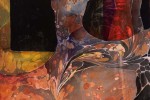 |
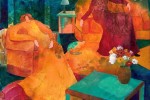 |
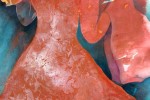 |
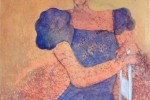 |
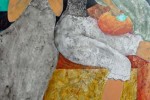 |
||||
|
Rich, strong, poignant, humorous and inspiring. We’ve caught twenty never-before-published poems by sixteen unique voices. |
Seven talented women search for themselves in their bodies, their family, themselves. |
Established dynamos and aspiring voices add colorful visions to our third issue. |
Language leaps off the page in the poetry and prose of five young authors who delight in sensory detail. |
Meet the authors and artists who make this Summer 2013 edition a rich, varied and engaging experience. |

|
LETTER FROM THE EDITORS
POETRY Abandoned Church by Tanya Jarvik Commencement by Kelly Running Depoe Bay by Wendy Thompson Directive by Cristina White Hawk Moth by Wendy Thompson How to Recycle Love Letters by Jennifer Dorner I Swapped a '74 Mustang for This by Jennifer Fulford Polaroid of My Mother by Cindy Stewart-Rinier Lover, Molester, and Maindens (Haibun) by Margaret Chula Savory by Pat Phillips West Seascape by Marjorie Power Suspended by Grace Kuhns The Hand-Off by Pattie Palmer-Baker The Ride by Linda Ferguson The Ticking Shirt by Tricia Knoll Three Facts about Sperm by Ursula Whitcher Three True Stories by Penelope Scambly Schott Today at the Library by Pat Phillips West Trapped Birds by Grace Kuhns You, who will be alive and reading after I'm gone by Penelope Scambly Schott PROSE After the World Ends by Kait Heacock Something Permanent by Ashley-Renée Cribbins Your Hand at Your Throat by Karen Guth Black Sharpie by Anne Gudger Diagnosis by Helen Sinoradzki For He's a Jolly Good Fellow by Laura Stanfill Breathing Underwater by Valerie Wagner ART Unity by Anne John Rearguard by Anne John Speculation by Anne John Wire by Jocelyn White Taitian Trio by Nani Chesire Catch Your Breath by Nani Chesire YOUNG VOICES We Will Read to You by Rebecca Cleveland-Stout Strawberry Party by Natalie Lerner A Young Night by Clara Beaumont Beach Wanderer by Isabella Waldron Light and Dark by Colette Au CONTRIBUTORS |
